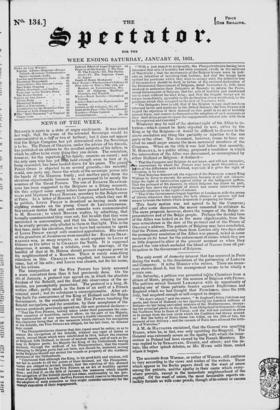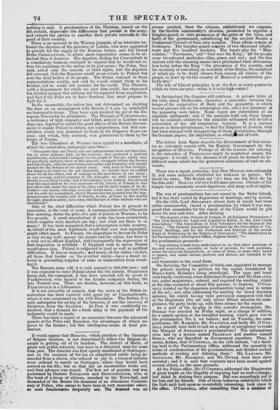The accounts from Warsaw, or rather of Warsaw, still continue
The accounts from Warsaw, or rather of Warsaw, still continue nothing is said. A proclamation of the Dictator, issued on the Sth instant, deprecates the differences that previil in the army,- and exhorts the parties to sacrifice their private interests to • the good of their country. There is an account in the Warsawjournals, of an interview be- tween the deputies of the province of Lublin, who were appointed to provide for the supply of the Russian troops, and the Grand Duke CONSTANTINE, to which more importance seems to be at- tached than it deserves. The deputies, finding the Czarowitsch in a conciliatory humour, ventured to request that he would not re- fuse his assistance to the nation in its just cause ; the Poles, they said, asked only the security of their rights, and the deputies felt assured, that the Russians could never return to Poland but over the dead bodies of its people. The Prince listened to these representations readily, and said he would submit them to his brother, but he could not promise for the result. The Dictator, with a discernment for which we give him credit, has expressed his decided opinion that nothing can be expected from negotiation, and that if the Poles are to have freedom, they must prepare to fight for it. In the meanwhile, the nation has not determined on shutting the door on an arrangement with Russia, if it can be concluded on honourable terms. arrangement have even invoked the aid of the Eu- ropean Powers for its attainment. The Marquis of WIELopoLsiti, a nobleman of high character and talent, arrived in London some clays ago, deputed to solicit the good offices of the British Govern- ment to enable Poland to obtain, not independence, but that con- stitution which was promised to them by the Emperor ALEXAN- DER; and which, they contend, was guaranteed to them by the treaty of Vienna. The two Chambers at Warsaw have agreed to a manifesto, of which the concluding paragraph runs thus- " Persuaded that our liberty and our independence have not been hos- tile to other nations; that, on the contrary, they produced a political equilibrium, and formed a rampart for the people of Europe, which may be peculiarly useful to them at this moment, we appear before the Powers and the People, with the conviction that policy and humanity will equally declare for the defence of our sacred cause. And, even in this struggle, the dangers of which we do not dissemble, we should have to combat alone for all the others, full of courage in the sacredness of our cause ; in our courage, and the support of the Almighty we shall combat for liberty to our latest breath ; and if Providence, in its wisdom, has decreed that this land shall be for ever enslaved—if the liberty of Poland in this last effort falls under the ruins of its cities and the dead bodies of its de- fenders—our enemy will reign over one desert more ; and the loyal Pole will die with the consolation, that if Heaven has not granted him the hap- piness to save his country and its liberty, he has, at least, by this mortal struggle, placed in safety, for a time, the liberties of other nations who are threatened."
One of the chief difficulties which Poland has at present to encounter, is the want of arms. A correspondent of the Chronicle this morning, states the price of a pair of pistols in Warsaw, to be five pounds. A small manufactory of arms has been established, which supplies sixty muskets per day ; but what are these to so many ? It has been suggested, that a subscription in this country, in behalf of the most legitimate revolt that ever was organized, might effect much. In France, the disposition to favour the Poles is very strong both among the people and the rulers, but there is a wish not to offend England, and consequently the expression of that disposition is withheld. If England were to move, France would move also. Poland is subjected to local as well as political difficulties. It has no seaports ; and nearly all the states—in fact, all those that border on the revolted duchy—have a direct in- terest in preventing supplies of arms or ammunition from reach- ing- it. The Russian army will, it is said, amount to 200,000 men ; and it was expected to enter Poland about the 8th instant. DIEBITSCH being sick, the command, it has been asserted, will be given to PASKEWITCH, who figured in the Asiatic campaign during the late Turkish war. There are doubts, however, on this head, as PASKEWITCH is a Lithuanian.
It is not unworthy of remark, that the news of the Polish in- surrection has been received with great joy at Constantinople, where it was announced on the 17th December. The Sultan, it is said, anticipates the saving of his treasure, if not the recovery of' his power, from the diversion. At Peta it was confidently ru- moured,_ that a demand for a fresh delay in the payment of the indemnity would be made. There has been a report of an encounter between the advanced guards of the Poles and Russians, the advantages of which are given to the former ; but this intelligence seems at least pre- mature.



























